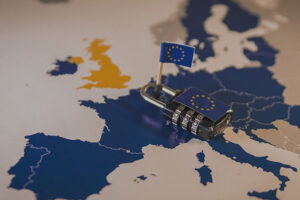One of Echez Group’s services is to protect our clients’ brands through different strategies and tools, but what do we protect the brands from? Today we want to tell you about the challenges and issues facing a brand that could be yours.
Counterfeiting and piracy
Illegal activities related to the infringement of intellectual property rights (IPR); including trademarks, copyrights, patents and design rights. Both are federal and state crimes, involving the manufacture or distribution of goods under another person’s name, and without their permission.
Counterfeit products range from high-end luxury consumer goods, to business-to-business products such as machines, software, and also common consumer products such as toys, pharmaceuticals, cosmetics, and food. In fact, any product protected by intellectual property can be counterfeited.
Brandjacking
Unauthorized use of a company’s trademark by consumers to such an extent that they may consider it their own and claim ownership of it.
Trademark abuse
This includes impersonation and illegitimate misrepresentation, false advertising and claims of affiliation with a trust mark.
Grey market or parallel market
This refers to products placed on the market outside of the approved manufacturer’s channel.
Direct link between counterfeiting, organized crime and terrorism
Counterfeiting not only has serious direct consequences for industries, brands, consumers, governments and economies, but also often supports other activities, such as organized crime groups. According to the U.S. Customs and Border Patrol; beyond the issues of intellectual property theft and consumer safety, there is a notion that sales of counterfeits directly fund terrorist organizations.
Federal Bureau of Investigation and Interpol seizure records suggest that millions of United States dollars in revenue from counterfeit goods (e.g. high-end and luxury automobile parts, and cigarettes) have gone to terrorist organizations.
However, the challenges are not just external. Many of the constraints on protecting a brand are:
- Intellectual property is not a priority in some countries, because the fight against drugs or hunger continues, or laws are misinterpreted.
- The penalty for infringement is very low or non-existent in some countries.
- The litigation process fails, as judges are lax in handling these cases in many countries. While waiting on the country, cases of litigation for infractions are dismissed due to lack of experience.
- Law enforcement agencies in some countries do not have the full support of their government. According to enforcement officials, their governments do not consider intellectual property a priority. Some mentioned that they see counterfeit products all the time, but if neither the brand nor the government supports them, they do not enforce any law enforcement intervention.
- Governments lose tax revenues generated by legitimate companies and may have more difficulty attracting investment when illegal competitors undermine the market. Counterfeiters increase their sales, which has a direct impact on brand revenues.
- Counterfeit products are destroying brand reputation, consumer confidence and business sustainability. It cuts into revenue and reduces economic welfare, health and safety. In addition, brand social responsibility can be highly compromised.
- Rising consumer health and safety problems, which cause increased illness and even death from counterfeit products. Examples in the pharmaceutical, medical device and agricultural industries.
- In pharmaceuticals, typical counterfeit drugs are those used in cancer therapy, HIV, erectile dysfunction treatments, intravenous solutions and antibiotics, among others. These drugs may:
a. Contain a different active agent than the one specified.
b. Contain the correct active agent, but in a dose that is too high or too low
c. Not contain active agents (more like a placebo).
d. Contain a contaminated agent.
e. Are wrapped in false packaging, and/or contain false patient information.
f. Have manipulated the expiration dates.
- In agriculture – counterfeit and adulterated fertilizers, animal nutrition products and pesticides that are damaging crops, contaminating animals, making fertile land infertile (affecting the local economy) and most significantly, threatening the health of the end consumer.
- Supply chain traceability is impaired by customs corruption in some countries. The common statement: “Some shipments are very difficult to trace due to high levels of corruption.”
- The high cost of disposing of counterfeit products. This implies storage and solid environmental disposal. For example, disposing of counterfeit chemicals and pesticides that present serious environmental and health risks can be costly and technically complex.
- Lack of dedicated resources, expertise and a reliable and scalable solution provider. We have heard in many cases that some companies have their own team to cover this, however they are limited, or do not have the right tools to reach the level of effectiveness expected by the brand. That’s where Echez Group’s experience can help.
The Solution
Many of the examples shared here are part of our daily findings, through our analysis of the 24/7 universe using our world-class business intelligence and analysis search engines.
The Echez Group has experts in this field, covering many industries worldwide. In addition, we have in our portfolio a Chain of Custody practice that helps to manage activities from automating contract compliance between entities through intelligent contracts to tracking products from manufacturing to distribution and finally to final sale.
June update 2022








